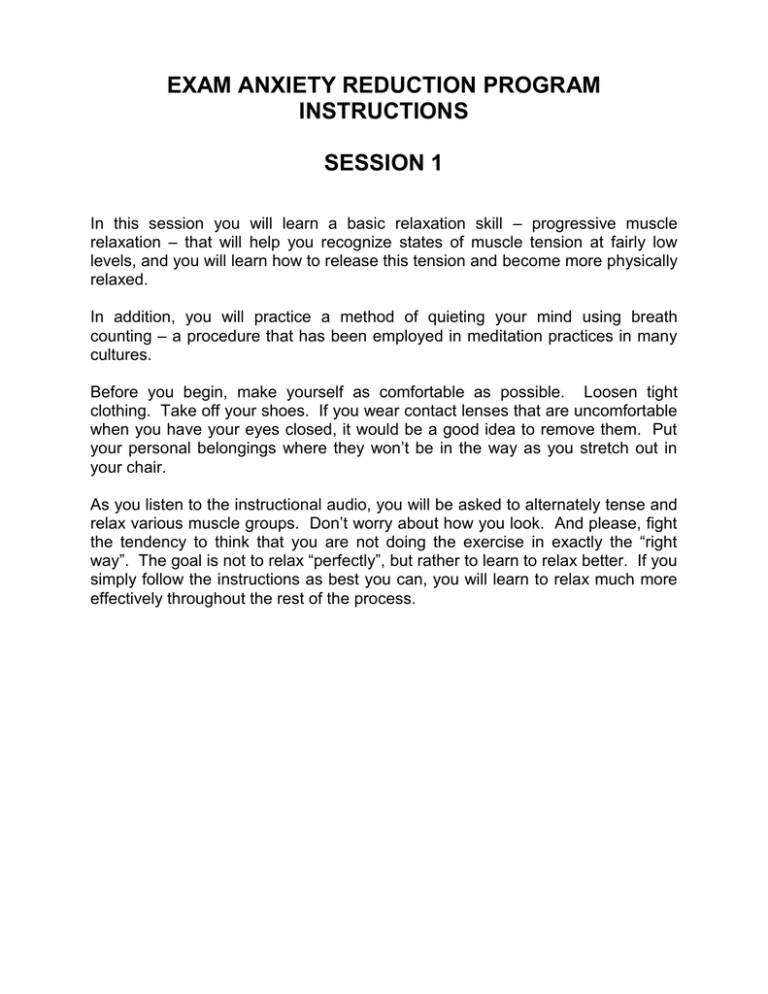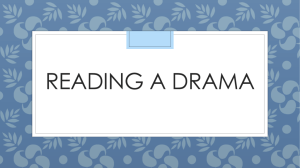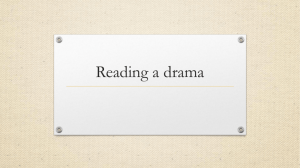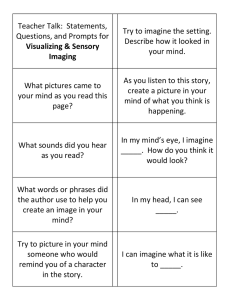Exam Anxiety Reduction Program
advertisement

EXAM ANXIETY REDUCTION PROGRAM INSTRUCTIONS SESSION 1 In this session you will learn a basic relaxation skill – progressive muscle relaxation – that will help you recognize states of muscle tension at fairly low levels, and you will learn how to release this tension and become more physically relaxed. In addition, you will practice a method of quieting your mind using breath counting – a procedure that has been employed in meditation practices in many cultures. Before you begin, make yourself as comfortable as possible. Loosen tight clothing. Take off your shoes. If you wear contact lenses that are uncomfortable when you have your eyes closed, it would be a good idea to remove them. Put your personal belongings where they won’t be in the way as you stretch out in your chair. As you listen to the instructional audio, you will be asked to alternately tense and relax various muscle groups. Don’t worry about how you look. And please, fight the tendency to think that you are not doing the exercise in exactly the “right way”. The goal is not to relax “perfectly”, but rather to learn to relax better. If you simply follow the instructions as best you can, you will learn to relax much more effectively throughout the rest of the process. SESSION 2 In this session you will learn a briefer relaxation technique that you will employ in all the subsequent sessions. This technique is the one that many students who take this program continue to employ in their daily lives. As well, you will be asked to imagine yourself in the following situation: “You are talking to someone you know who has a test.” Besides using the physical relaxation technique to reduce your anxiety, you might also wish to use one of the following coping strategies: - Repeat to yourself, “It’s not my problem. It doesn’t help anybody if I get tense.” Or, “This situation does not threaten me.” Or, “There’s no point in getting upset about this situation”. - Imagine yourself in the scene and imagine saying “Relax” to yourself. Imagine counting a few breaths and becoming more relaxed. SESSION 3 In this session, after a few relaxation instructions, you will be asked to mentally review the situation you dealt with in the last session. This will help consolidate your feelings of calmness about that situation. Following this, you will be asked to mentally rehearse two new situations. For each situation, some coping strategies are suggested. You may develop others as you go through the process. Scene 2: “You’re in class. The instructor announces a major exam in two weeks.” - Imagine mentally reviewing your schedule and be able to see that you have sufficient time to review. - Imagine making a couple of notes about things that you should devote some special attention to as you prepare for the test. - Imagine listening closely to the instructor for any advice the instructor gives you about the test. - Imagine saying to yourself, “Well, I’d better get busy. My anxiety is telling me that I have things to do.” Scene 3: “You’re in your place of study – reading and preparing for the exam which is one week away.” - Imagine yourself calmly making notes and practicing the skills you will have to demonstrate on the test. - Imagine getting a bit tense but being able to reduce the tension with a few moments of relaxation. - Imagine saying to yourself, “One thing at a time. I just have to work on this one thing right now.” SESSION 4 Again, you will receive some preliminary relaxation instructions, and then be asked to mentally review the last scene you practiced. Then you will go on to three new scenes. Scene 4: “It’s two days before the exam. studying for the test.” You’re reading and - Concentrate on reviewing material that you have previously studied. If you must learn new things, imagine yourself deliberately and calmly going about this task - Imagine yourself taking the steps that you know will help you feel better about yourself – relaxing by listening to music, eating properly, working out, getting enough rest, going for a walk. Scene 5: “It’s the night before the exam.” - Imagine yourself calmly reviewing material you have previously studied. - Imagine yourself calmly getting things organized for the next day – deciding what to wear, laying out your books and materials, finding your car keys or bus fare, making sure you have extra batteries for your calculator, and so on. - Do not allow yourself to be harassed by the things you do not know. Learning never stops and you could always learn more – but right now your job is to stay relaxed so you can demonstrate what you do know. Scene 6: “It’s the day of the exam. You’re at your place of study.” - Imagine yourself calmly reviewing a couple of basic principles, or going over only one or two items of information you want to remember for the test. - If you allow yourself to be bothered by what you do not know, say to yourself, “It’s true that I don’t know everything. But nobody knows absolutely everything. I will just relax a bit more so that I don’t get in my own way.” SESSION 5 Scene 7: “You’re walking across campus on the way to the exam.” - Focus on relaxing as you walk. Shrug your shoulders to get rid of the little bit of tension in your shoulders. Breathe deeply. - Deliberately distract yourself by observing your surroundings – look at the people, the buildings, posters in the hallways and so on. - Make sure you have adequate time to walk to the exam without feeling rushed. Scene 8: “You’re waiting outside the exam room ten minutes before the start of the exam. You hear some people talking about the test and you think about not being adequately prepared.” - In the first place, you should avoid the crowd and avoid talking about the test. Imagine yourself calmly walking down the hall, away from the people who are making themselves anxious. - Don’t worry about what other people guess might be on the test. Their guesses might be wrong. In any case, there’s nothing you can do about it except to relax so that you can do as well as you can on the test. - Imagine saying to yourself, “So, they know some things I don’t know. But I also know things they don’t know.” - Imagine bringing your anxiety level down just a bit by doing some brief relaxation exercises. Scene 9: “You’re in the exam room, waiting for the test to be handed out.” - Imagine yourself deliberately relaxing as you wait. - Say to yourself, “What’s done is done. There is no point worrying now. Worrying will not help me remember more things or to do better on the test. SESSION 6 Scene 10: “You’re taking an important test. You look at the test and discover that you cannot answer 1 out of 4 questions.” - Think, “Well, I’ll have to take some time to think about that one. Probably after a while I’ll be able to think of some points that are relevant. In the meantime I’ll answer the questions I’m more comfortable with.” - Think, “Well, I already know that I’m not going to get 100% on the test. This is no surprise. If I stay cool, I’ll get lots of points on the questions I know and there’s a chance I’ll be able to come back and get some points on the hard question too.” - You may actually know the answer but just not feel sure about it. Think about it for a while and then put down what you know. Scene 11: As in Scene 10 except that you think you don’t know the answers to 3 out of 4 questions. - Think, “If I’m finding the exam tough, the chances are that everybody is. We’re all in the same boat.” - Resist the impulse to give up. Carefully read the questions, jot a few rough notes about each question. Take a few minutes to think about each question before you start to answer. By working carefully and deliberately you increase your chances. - If you feel that you’re completely blocked, take a few moments to do a short relaxation exercise and then return to the questions more calmly. Trying to force yourself to perform better simply won’t work. Scene 12: “While thinking about an important question on a test, you look up and notice that everybody else in writing rapidly.” - Think, “What they are doing is irrelevant to what I am doing – which is being thoughtful and careful.” - Think, “This is just a sampling error. As soon as I look down somebody else will look up and have the same panicky thought.” - Think, “They’re just making mistakes at a faster rate than I am.” SESSION 7 - THE LAST SESSION! Scene 13: “The monitor announces that there are thirty minutes left on the exam and you think that you have an hour’s work.” - Think, “So what? I already knew that I wasn’t going to get 100%. I’ll just do the best I can with the time remaining.” - Think, “Well, the chances are good that everyone else is feeling rushed too.” - Resist the impulse to rush through the remaining questions. Continue to work carefully as well as quickly. Scene 14: “Ten minutes before the end of the exam, you discover that you have made a serious error in an important question.” - Resist the impulse to scribble out your answer. Make corrections slowly and carefully. - If you are really rushed, answer in point form, indicating a rough outline of the major ideas you would include in a full answer. This will probably help get you partial credit. - If you are not sure how to answer, put down any ideas you can think of. Again, you may get partial credit for doing this. If you put down nothing, or cross out everything that you’ve written already, you might very get zero. - Stay cool. Remember, you have answered the rest of the test.


